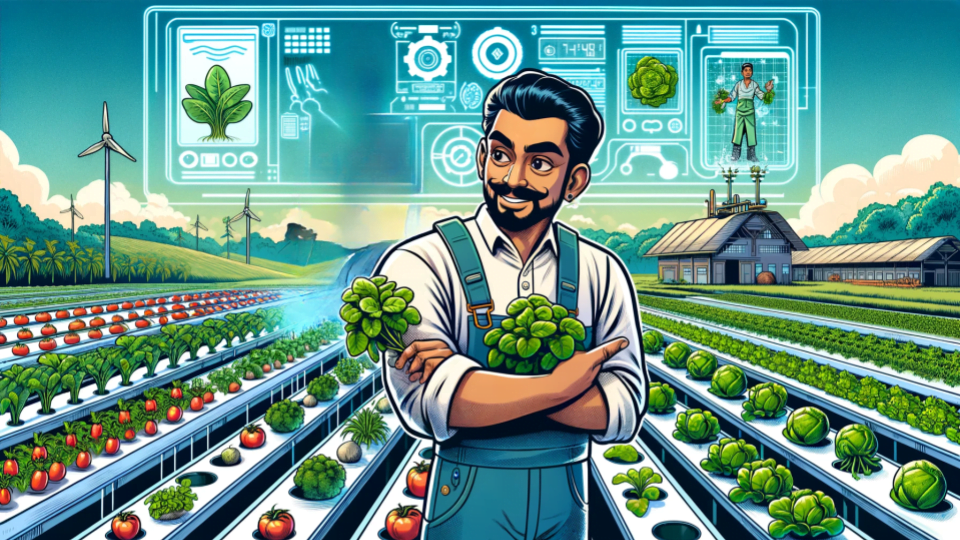Grow Green, Earn Big : Eeki Foods’ Agritech Revolution

Eeki Foods, an agritech startup, sprouted from the innovative minds of Amit Kumar and Abhay Singh, friends since their first week at IIT-Bombay in 2009. Venturing into entrepreneurship in 2018, they aimed to revolutionize Indian agriculture. Their journey began with extensive research in hydroponics on a 10,000 sq ft plot, focusing on sustainable and efficient farming practices. Today, Eeki Foods stands as a beacon of innovation in the agritech landscape.
The mission of Eeki Foods is rooted in sustainability and efficiency. They address critical challenges in traditional agriculture, such as water scarcity and soil degradation. By employing hydroponics, a method of growing plants without soil, they significantly reduce water usage and eliminate the need for harmful pesticides. This approach is not only environmentally friendly but also ensures the production of healthy, chemical-free vegetables.
Eeki Foods’ operations span across various Indian states, bringing a revolutionary change to conventional farming methods. Their core produce includes staples like tomatoes, cucumbers, and green chillies. Remarkably, they offer these vegetables at competitive prices, aligning closely with local ‘mandi rates’. This price efficiency is a testament to their innovative farming techniques and strategic business model.
The founders’ vision transcends mere profit. They aim to contribute positively to India’s food security and sustainability. By tackling issues like water wastage and chemical use in agriculture, Eeki Foods is paving the way for a future where farming is both eco-friendly and economically viable. Furthermore, their approach is scalable, holding the promise of widespread adoption across the nation’s diverse agricultural landscape.
Hydroponics Hack : How Eeki Waters Innovation
Eeki Foods has distinguished itself in the agritech industry with its groundbreaking hydroponics system. Their innovation lies in the patented growing chambers, a cornerstone of their farming methodology. These chambers enable soilless cultivation, a radical departure from traditional farming. They utilize a proprietary polymer composite material for containers, creating an optimal environment for plant growth.
The technology developed by Eeki Foods is specifically tailored to Indian climatic conditions. It ensures the maintenance of ideal root zone temperatures and humidity levels. This capability is crucial, especially in regions like Rajasthan, where temperatures fluctuate drastically. Their system is designed to withstand these extreme conditions, enabling year-round cultivation of vegetables like tomatoes, cucumbers, and green chillies.
Their hydroponic farms operate with impressive water efficiency. They use about 80% less water compared to conventional farming methods. This significant reduction is not only environmentally sustainable but also highly beneficial in water-scarce regions. Additionally, their approach eliminates the need for pesticides, providing a chemical-free and healthier produce option for consumers.
Another aspect of their technological edge is the integration of IoT (Internet of Things) into their farming processes. This incorporation allows for remote monitoring and control of critical parameters in the growing process. It includes aspects like nutrient levels, water usage, and environmental conditions. This data-driven approach ensures optimal growing conditions and significantly enhances the efficiency and yield of the crops.
Moreover, Eeki Foods has eliminated the need for energy-intensive infrastructure commonly used in hydroponic systems, such as coolers, chillers, and blowers. Much of the energy for their operations is sourced from solar panels, further underscoring their commitment to sustainability
Harvesting Prosperity : Impact on Indian Agriculture
Eeki Foods’ entry into the Indian agriculture sector marks a significant shift in traditional farming practices. Their innovative hydroponic technology has the potential to revolutionize the way food is produced, especially in a country grappling with challenges like soil degradation, water scarcity, and the use of harmful pesticides.
One of the most notable impacts of Eeki Foods is on water conservation. Traditional agriculture in India is heavily reliant on monsoon rains and irrigation, often leading to water wastage. Eeki Foods’ hydroponic system, which uses 80% less water than conventional farming, offers a sustainable solution to this problem. This is particularly crucial for India, where water scarcity is a growing concern.
Eeki Foods also addresses the challenge of pesticide use in agriculture. By eliminating the need for chemical pesticides in their hydroponic system, they ensure the production of healthier, chemical-free vegetables. This not only benefits consumers who are increasingly health-conscious but also aligns with global trends towards organic and sustainable produce.
Furthermore, Eeki Foods’ technology enables farming in areas with poor soil quality or extreme climatic conditions, like the arid regions of Rajasthan. This expands the potential for agricultural productivity in parts of India that were previously unsuitable for intensive farming. Their system allows for year-round cultivation, overcoming the limitations of seasonal farming and ensuring a consistent supply of fresh produce.
The scalability of Eeki Foods’ hydroponic technology is another significant aspect. It paves the way for widespread adoption across India’s diverse agricultural landscape. This scalability is crucial for a country where a large portion of the population is dependent on agriculture for their livelihood. By introducing more efficient and sustainable farming methods, Eeki Foods is contributing to a transformation in Indian agriculture that can lead to higher yields, increased farmer incomes, and enhanced food security.
Blueprint for the Future : Eeki Foods’ Business Model
Eeki Foods’ business model is a blend of technological innovation and strategic partnerships. Central to their model is the asset-light approach, which significantly reduces the capital expenditure typically associated with setting up and operating large-scale farms. This approach has allowed Eeki Foods to expand rapidly and sustainably.
The company collaborates with local farming partners, utilizing their land to set up hydroponic farms. These partnerships are mutually beneficial. Eeki Foods provides the technology and expertise, while the landowners contribute their unused or less fertile land. This collaboration enables the farmers to generate income from land that might otherwise remain unproductive. The operational model includes Eeki taking care of all day-to-day operations, including growing, harvesting, and selling the produce to B2B clients.
Eeki Foods’ strategy revolves around creating a scalable and replicable model that can be adapted to different regions and climatic conditions across India. They have developed a system that allows for remote monitoring and control of the farms, ensuring consistent quality and yield across different locations. This technological prowess not only streamlines operations but also ensures that the produce is of the highest quality.
The company’s focus on scaling is evident in their expansion plans. Starting from a modest 10,000 sq ft plot, Eeki Foods has grown to operate on several acres of land and aims to expand further. This rapid scaling is a testament to the effectiveness and adaptability of their business model.
Nurturing Partnerships : Eeki foods’ Collaborative Growth
Eeki Foods’ funding and collaboration story is a testament to its innovative approach and potential impact in the agritech sector. Key details of these aspects highlight the company’s journey and the trust it has garnered in the industry.
The $6.5 Billion Series A financing round led by General Catalyst was a significant milestone for Eeki Foods. General Catalyst is a major player in the venture capital space, known for backing companies that demonstrate potential for significant societal impact. Their decision to lead this round of funding for Eeki Foods signals strong confidence in the company’s technology, business model, and future prospects in transforming India’s agricultural landscape. (Crunchbase)
Notably, Irving Fain, CEO and Founder of Bowery Farming, participated in this funding round. Bowery Farming, being a part of the General Catalyst portfolio and a global leader in agritech, brings not only financial support but also a wealth of knowledge and experience in the sector. This kind of backing is crucial for a startup like Eeki Foods as it navigates the complex and rapidly evolving world of agritech.
Beyond funding, Eeki Foods has established significant partnerships with farming communities and landowners. These partnerships are integral to their asset-light business model, which relies on using existing land resources for setting up hydroponic farms. This collaborative approach not only reduces capital expenditure but also fosters community involvement and sustainable farming practices. It is a model that benefits both Eeki Foods and the local farming communities by creating a symbiotic relationship where technology and traditional farming knowledge come together for mutual benefit.
Lessons For Aspiring Entrepreneurs : Eeki Foods’ Blueprint
Eeki Foods’ journey offers valuable lessons for entrepreneurs, particularly those venturing into the agritech sector. Their journey from a concept to revolutionizing Indian agriculture with hydroponic technologies offers a treasure trove of insights for entrepreneurs. The lessons gleaned from their success story are not just applicable to those in agritech but to any entrepreneur aiming to make a mark in their industry. As we delve into these lessons, it’s important to remember that each insight is a distilled essence of hard-earned experience, reflecting the challenges, innovations, and strategic thinking that powered Eeki Foods’ journey.
Embrace Innovation:
Eeki Foods stands as a prime example of how embracing technological innovation can lead to significant industry disruption. Their development of a proprietary hydroponics system and growing chambers demonstrates the power of innovation in addressing traditional challenges in agriculture, like water scarcity and the use of pesticides.
Adapt to Local Conditions:
Their success in tailoring their technology to suit Indian climatic conditions, especially in challenging environments like Rajasthan, underscores the importance of contextual adaptation. Entrepreneurs should focus on creating solutions that are not just technologically advanced but also adaptable to local conditions and requirements.
Sustainable Practices are Key:
The company’s commitment to sustainability, evident in their water-efficient systems and reduction of pesticide use, highlights the growing significance of environmentally friendly practices in business. This approach not only benefits the environment but also resonates with increasingly eco-conscious consumers.
Strategic Partnerships Amplify Impact:
Their collaboration with local farmers and strategic investors illustrates how partnerships can amplify a company’s impact. Entrepreneurs should seek collaborations that align with their business goals and values, as these can provide not just financial backing but also valuable expertise and market access.
Scaling with a Vision:
The rapid scaling of Eeki Foods from a small plot to several acres, with plans for further expansion, shows the importance of having a clear vision for growth. Entrepreneurs should plan for scalability from the outset, ensuring that their business model can accommodate and thrive under expansion.
Eeki Foods’ path from inception to industry innovator encapsulates vital lessons for today’s entrepreneurs. Their approach to solving complex problems with innovative solutions, adapting technology for local conditions, and focusing on sustainability and scalability offers a blueprint for building a successful venture in any sector. As we reflect on these lessons, let’s carry forward the spirit of innovation, resilience, and sustainability that Eeki Foods exemplifies. For aspiring entrepreneurs, their story is a guiding light, illuminating the path to not just commercial success but to making a tangible, positive impact on the world. Let these lessons inspire you to embark on your entrepreneurial journey with confidence and purpose.
Conclusion : Beyond the Farm, Eeki Foods’ New Frontiers
Eeki Foods has redefined the agricultural landscape of India by integrating advanced hydroponic technologies into their operations. Their innovative approach not only champions the coexistence of technology and nature but also addresses some of the critical challenges faced by traditional farming methods. By reducing water usage by 80%, eliminating pesticides, and facilitating year-round production in adverse climates, Eeki Foods exemplifies the potential of sustainable agriculture.
The company’s achievements extend beyond environmental benefits; they underscore a significant shift in food production strategies. Eeki Foods illustrates that it’s feasible to run a profitable, scalable enterprise that also makes a positive societal and environmental impact. This model serves as an invaluable blueprint for entrepreneurs and businesses globally, particularly at a time when sustainable practices are imperative.
For those inspired by Eeki Foods’ story and interested in exploring more about the potential of agritech, we recommend reading about other pioneering startups in our collection of articles. Discover Vertical Future and their advancements in vertical farming technology, FarmAgain‘s innovations in automating agriculture, and Fuselage‘s efforts in optimizing farm management through AI. Each of these companies contributes uniquely to the evolving landscape of sustainable agriculture, offering fresh perspectives and solutions that could further revolutionize the industry.
Creative Head – Mrs. Shemi K Kandoth
Content By Dork Company
Art By Dork Company
100 Startups by IIT Madras in 2024: A Landmark Entrepreneurial
IIT Madras, a leader in India’s education and research, embarks on an ambitious journey. In…
Inside Indie Hackers: How a Transparent Community of Founders is
Indie Hackers, established in 2016 by Courtland Allen, is a thriving online community and resource…
Cursor: How 4 MIT Graduates Built the Fastest-Growing AI Startup
Cursor, an AI-powered integrated development environment (IDE), emerged in 2022 as one of the fastest-growing…
Vercel: This Startup Is Quietly Powering the Internet — And
Founded in 2015 by Guillermo Rauch and Naoyuki Kanezawa, Vercel—originally known as Zeit—set out to…
Tella: How This Tiny Team Is Revolutionizing Screen Recording
Tella is a modern screen recording platform built for today’s content creators and video professionals….
CarDekho: How Two IIT Brothers Changed The Way India Bought
CarDekho, a prominent name in the Indian automotive industry, has revolutionized the way people buy,…
Kovai.co: The Startup That Gave ₹14 crore To Its 140
The idea for Kovai.co started when Saravana Kumar, the CEO, was working as a software…




















Leave a Reply
You must be logged in to post a comment.